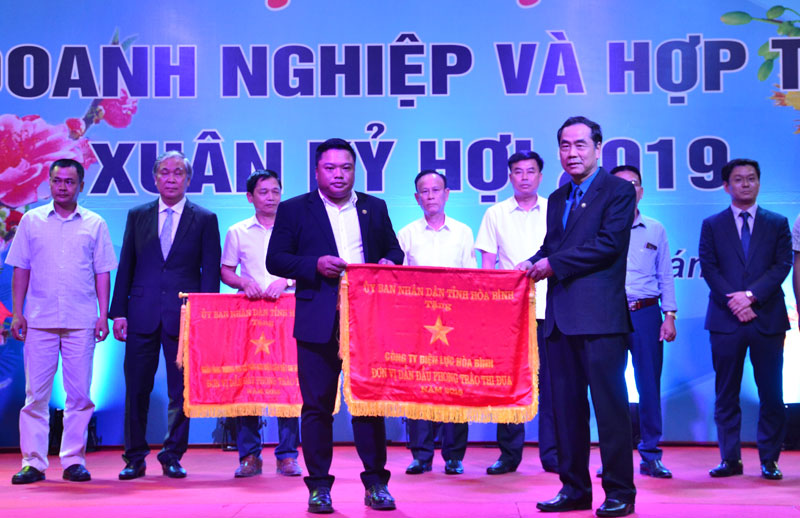
(HBO) – The Hoa Binh province People’s Committee organised a meeting with local businesses and cooperatives on February 20. The event was attended by Secretary of the provincial Party Committee Bui Van Tinh, Permanent Deputy Secretary of the provincial Party Committee and Chairman of the provincial People’s Council Tran Dang Ninh, Deputy Secretary of the provincial Party Committee and Chairman of the provincial People’s Committee Nguyen Van Quang, and Chairman of the Vietnam Association of Small and Medium Enterprises Nguyen Van Than.
By the end of 2018, the province had 3,175 businesses, 275
cooperatives, and more than 625 representative offices and branches with a total
registered capital of nearly 35 trillion VND. The province housed 531 projects,
of which foreign investors poured 505 million USD in 38 ones and disbursed some
279 million USD. There were 27 operating projects at that time, generating a
revenue of 460 million USD, contributing 92.9 billion VND to the local budget,
and creating jobs for 17,500 local labourers. Meanwhile, domestic investors
registered around 66.45 trillion VND in 493 projects, 239 of which had been put
into operation.
Last year, local businesses and cooperatives contributed more than 1.91
trillion VND to the state budget.

Photo: Chairman of the provincial
People’s Committee Nguyen Van Quang presents emulation flags to excellent firms
in 2018.
On behalf of the provincial leaders, Secretary of the provincial
Party Committee Bui Van Tinh wished the local business community a new year of good
health, happiness and success.
Underlining opportunities and challenges for the investors as well as the
province’s socio-economic development potential, Tinh asked competent agencies
to carry out rational measures to better local business climate, and work to
remove bottlenecks for the investors.
First and foremost, he called for support for the investors to implement
projects that have already received investment plan certificates.
Also, he laid stress on the organisation of investment promotion conferences
with businesses and strategic partners towards creating breakthroughs in local
socio-economic development in 2019 and the following years.
On the occasion, the provincial People’s Committee presented 11 emulation
flags, 42 certificates of merit to outstanding businesses and cooperatives. The
committee also launched an emulation campaign among local business community under
the theme of "Promoting solidarity and accelerating business and production to
realise the province’s socio-economic development target in 2019”./.
Hoa Binh province is undergoing a dynamic transformation amid Vietnam’s national digital transition. Building on Poliburo’s Resolution No. 57-NQ/TW on breakthroughs in science, technology, innovation, and national digital transformation, the province has rolled out a wide range of practical action plans. A standout initiative is the "Digital Literacy for All” movement, an effort to ensure that no one is left behind in the digital era.
Hoa Binh province is undergoing a dynamic transformation in the wake of the national digital transformation movement. Building on Resolution No. 57-NQ/TW of the Politburo on breakthroughs in science, technology, innovation, and national digital transformation, the province has implemented a wide range of practical action plans. A standout initiative is the "Digital Literacy for All” movement ambitious effort to ensure that no one is left behind in the digital age.
With a spirit of unity and proactive problem-solving, the Party Committee, the government and the people of Dong Lai Commune (Tan Lac District) have made great strides in implementing the resolutions of the 24th Party Congress of the commune for the 2020 - 2025 term. Focusing on leadership and practical actions, the commune has brought the Party’s resolutions into daily life, creating strong impacts and pushing the local development forward.
Amid the nationwide push for digital transformation, young people in Hoa Binh Province are stepping up as dynamic pioneers, applying technology to enhance Youth Union operations and expand the reach of youth-led initiatives. Through creativity and adaptability, Youth Union organizations at all levels have introduced a series of practical solutions, contributing to modern governance and community development.
In recent years, An Nghia commune, located in Lac Son district, has stepped up administrative reform, focusing on improving the quality and efficiency of its single-window service unit for receiving and processing administrative procedures. These improvements have helped create favourable conditions for local residents and organisations to handle administrative procedures, contributing to the commune’s broader socio-economic development.
The Prime Minister-approved master plan to develop the multi-use value of forests ecosystems through 2030, with a vision to 2050, aims to improve the management and sustainable use of forest resources, create jobs, increase incomes, and improve the living standards of ethnic minorities, people in mountainous and remote areas, forest workers and those living near forests.



